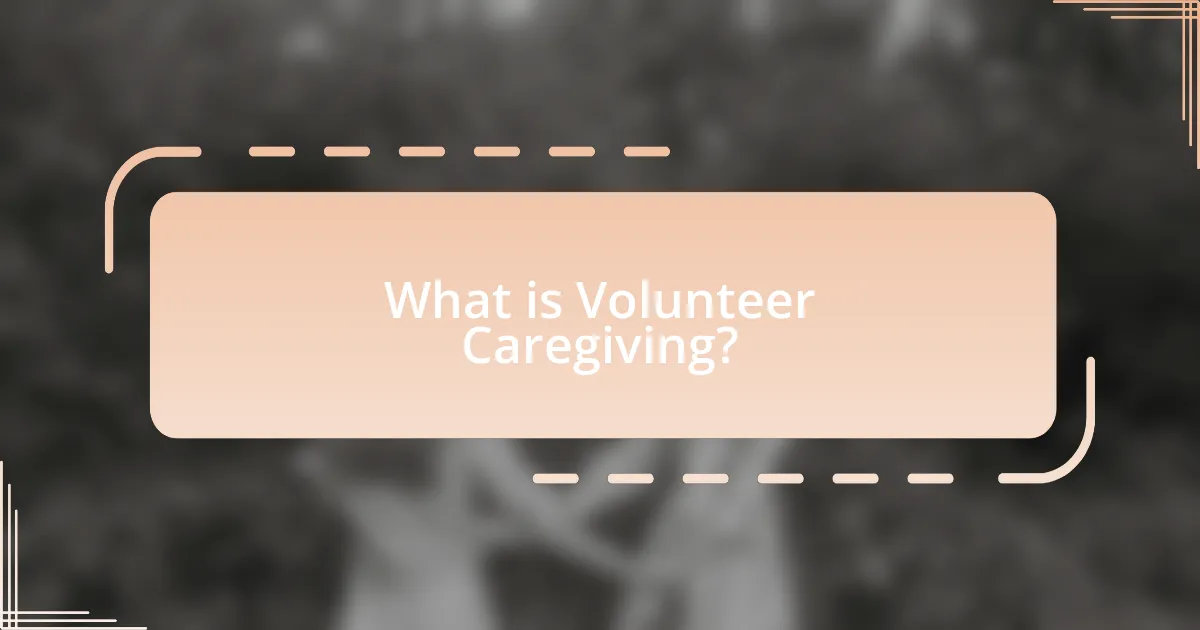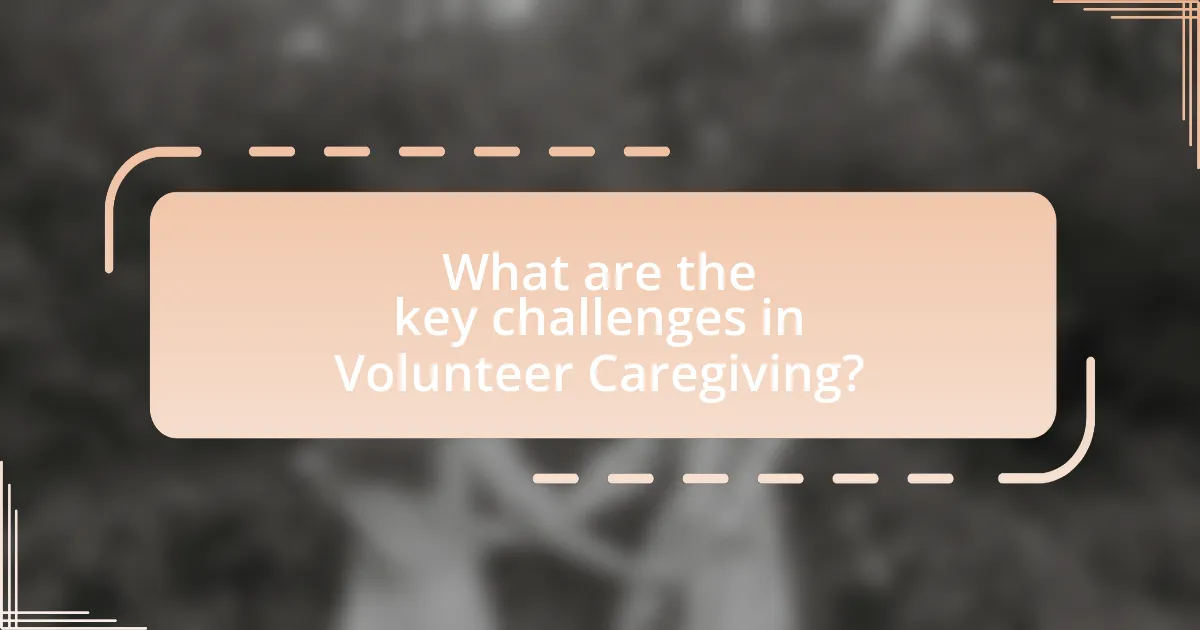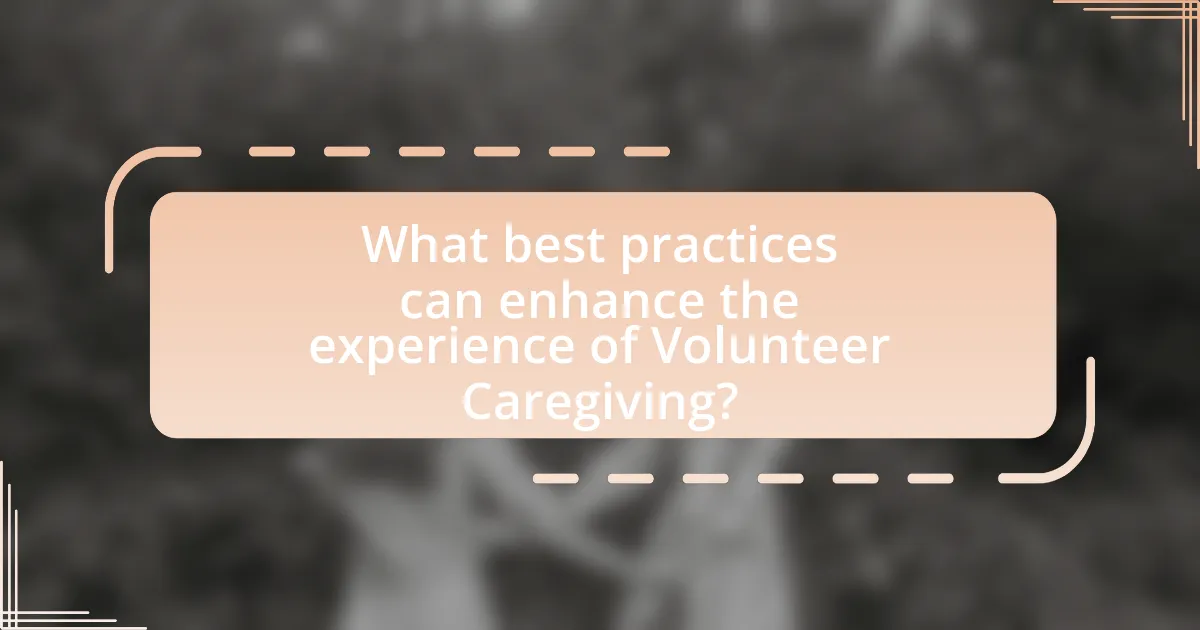Volunteer caregiving involves providing unpaid support to individuals in need, such as the elderly or disabled, through tasks like companionship and personal care. This article explores the significant impact of volunteer caregivers on individual well-being and community health, highlighting their roles in reducing isolation and enhancing mental health. It addresses the challenges caregivers face, particularly regarding time management and emotional stress, while offering strategies for maintaining personal well-being. Additionally, the article emphasizes the importance of community support and best practices to improve the caregiving experience, ultimately underscoring the balance between caregiving responsibilities and self-care.

What is Volunteer Caregiving?
Volunteer caregiving is the act of providing unpaid assistance and support to individuals in need, such as the elderly, disabled, or chronically ill. This form of caregiving often includes tasks like companionship, personal care, and help with daily activities. Research indicates that volunteer caregivers play a crucial role in enhancing the quality of life for those they assist, as they contribute to emotional support and social interaction, which are vital for mental health. According to a study published in the Journal of Gerontology, volunteer caregivers significantly reduce feelings of isolation among recipients, demonstrating the positive impact of their involvement.
How does Volunteer Caregiving impact communities?
Volunteer caregiving positively impacts communities by fostering social connections and enhancing the well-being of both caregivers and recipients. Research indicates that volunteer caregivers contribute to improved mental health outcomes, as they often experience increased feelings of purpose and community belonging. For instance, a study published in the Journal of Community Psychology found that communities with active volunteer caregiving programs reported lower levels of social isolation and higher overall community satisfaction. Additionally, volunteer caregiving can alleviate pressure on local healthcare systems by providing essential support to individuals in need, thereby promoting a more resilient community structure.
What roles do volunteer caregivers play in society?
Volunteer caregivers play essential roles in society by providing support and assistance to individuals in need, particularly the elderly, disabled, or those facing health challenges. They help improve the quality of life for these individuals through companionship, personal care, and emotional support, which can significantly reduce feelings of isolation and enhance mental well-being. Research indicates that volunteer caregivers contribute to the healthcare system by alleviating the burden on professional caregivers and reducing healthcare costs, as they often provide services that would otherwise require paid assistance. For instance, a study published by the National Alliance for Caregiving found that approximately 34 million Americans have provided unpaid care to an adult age 50 or older, demonstrating the substantial impact of volunteer caregivers on community health and support systems.
How do volunteer caregivers contribute to the well-being of individuals?
Volunteer caregivers significantly enhance the well-being of individuals by providing essential emotional support, companionship, and practical assistance. This support helps reduce feelings of isolation and loneliness, which are common among those receiving care. Studies indicate that individuals who receive care from volunteers often experience improved mental health outcomes, including reduced depression and anxiety levels. For instance, a report from the National Alliance for Caregiving highlights that volunteer caregiving can lead to a 20% increase in the emotional well-being of care recipients. Additionally, volunteer caregivers assist with daily activities, which can improve the overall quality of life for individuals, enabling them to maintain independence and dignity.
Why is balancing time commitment important in Volunteer Caregiving?
Balancing time commitment is crucial in volunteer caregiving because it ensures that caregivers can provide effective support without compromising their own well-being. When caregivers allocate their time wisely, they can maintain their physical and mental health, which is essential for sustaining long-term volunteer efforts. Research indicates that caregivers who manage their time effectively report lower levels of stress and burnout, leading to more consistent and quality care for those they assist. For instance, a study published in the Journal of Gerontological Social Work found that caregivers who practiced time management techniques experienced a 30% reduction in stress levels, highlighting the importance of balance in caregiving roles.
What challenges do volunteer caregivers face regarding time management?
Volunteer caregivers face significant challenges regarding time management, primarily due to the competing demands of caregiving responsibilities and personal commitments. These caregivers often struggle to allocate sufficient time for their caregiving tasks while also managing their own work, family, and social obligations. Research indicates that approximately 60% of volunteer caregivers report feeling overwhelmed by the time required for caregiving, which can lead to stress and burnout. Additionally, the unpredictable nature of caregiving tasks, such as medical appointments or emergencies, further complicates their ability to maintain a structured schedule. This combination of factors highlights the critical need for effective time management strategies among volunteer caregivers to balance their commitments and well-being.
How can volunteer caregivers prioritize their responsibilities effectively?
Volunteer caregivers can prioritize their responsibilities effectively by assessing the urgency and importance of tasks, creating a structured schedule, and setting clear boundaries. By using tools like the Eisenhower Matrix, caregivers can categorize tasks into four quadrants: urgent and important, important but not urgent, urgent but not important, and neither urgent nor important. This method allows caregivers to focus on high-priority activities that directly impact the well-being of those they care for. Additionally, establishing a routine helps in managing time efficiently, while setting boundaries ensures that caregivers do not overextend themselves, thus maintaining their own well-being. Research indicates that caregivers who implement structured time management strategies report lower stress levels and improved satisfaction in their caregiving roles.
What are the personal well-being considerations for volunteer caregivers?
Personal well-being considerations for volunteer caregivers include managing stress, maintaining physical health, and ensuring emotional support. Volunteer caregivers often face emotional strain due to the demands of caregiving, which can lead to burnout if not addressed. Research indicates that caregivers who engage in regular self-care practices, such as exercise and social activities, report lower levels of stress and improved mental health. Additionally, establishing boundaries and seeking support from peers or professional resources can enhance their overall well-being, as highlighted in studies by the Family Caregiver Alliance, which emphasize the importance of caregiver support networks in mitigating the risks of isolation and emotional fatigue.
How does volunteering affect mental health and emotional well-being?
Volunteering positively affects mental health and emotional well-being by enhancing feelings of purpose and reducing symptoms of depression and anxiety. Engaging in volunteer activities fosters social connections, which can lead to improved mood and increased life satisfaction. Research published in the Journal of Happiness Studies indicates that individuals who volunteer regularly report higher levels of happiness and lower levels of stress. Furthermore, a study by the Corporation for National and Community Service found that volunteers experience a 27% greater likelihood of reporting good mental health compared to non-volunteers. These findings underscore the significant benefits of volunteering on mental health and emotional well-being.
What strategies can volunteer caregivers use to maintain their well-being?
Volunteer caregivers can maintain their well-being by implementing self-care practices, setting boundaries, and seeking social support. Self-care practices, such as regular exercise, adequate sleep, and mindfulness techniques, help reduce stress and improve mental health. Setting boundaries allows caregivers to manage their time effectively, ensuring they do not overcommit and can allocate time for personal needs. Seeking social support from friends, family, or support groups provides emotional relief and practical advice, which is crucial for sustaining their caregiving role. Research indicates that caregivers who engage in these strategies report lower levels of stress and higher overall well-being.

What are the key challenges in Volunteer Caregiving?
The key challenges in volunteer caregiving include time constraints, emotional stress, and lack of support. Volunteer caregivers often struggle to balance their caregiving responsibilities with personal commitments, leading to feelings of overwhelm. Emotional stress arises from witnessing the suffering of those they care for, which can impact their mental health. Additionally, many volunteer caregivers report insufficient support from organizations, making it difficult to access resources or training that could enhance their caregiving experience. These challenges are documented in studies, such as the 2020 report by the National Alliance for Caregiving, which highlights the need for better support systems for volunteer caregivers.
How do time constraints affect volunteer caregivers?
Time constraints significantly impact volunteer caregivers by limiting their ability to provide consistent and quality care. When caregivers face tight schedules, they often experience increased stress and burnout, which can lead to decreased effectiveness in their caregiving roles. Research indicates that 40% of volunteer caregivers report feeling overwhelmed due to time pressures, which can result in neglecting their own well-being and personal responsibilities. This imbalance not only affects the caregivers’ mental health but also the quality of care provided to those they assist, highlighting the critical need for manageable time commitments in volunteer caregiving.
What are common time-related obstacles faced by volunteer caregivers?
Common time-related obstacles faced by volunteer caregivers include scheduling conflicts, lack of flexible hours, and the demands of personal responsibilities. Scheduling conflicts arise when caregivers have difficulty aligning their availability with the needs of those they assist, often due to work or family commitments. Lack of flexible hours can limit caregivers’ ability to provide support, especially if they are only available during traditional working hours. Additionally, personal responsibilities, such as childcare or employment, can further constrain the time caregivers can dedicate to their volunteer roles. These challenges highlight the need for better support systems and flexible arrangements to accommodate the diverse schedules of volunteer caregivers.
How can volunteer caregivers overcome these time constraints?
Volunteer caregivers can overcome time constraints by implementing effective time management strategies. These strategies include prioritizing tasks, setting realistic goals, and utilizing scheduling tools to allocate specific time slots for caregiving responsibilities. Research indicates that caregivers who use structured planning techniques report reduced stress and improved efficiency in their caregiving roles. For instance, a study published in the Journal of Gerontological Nursing found that caregivers who employed time management practices experienced a 30% decrease in feelings of overwhelm. By adopting these methods, volunteer caregivers can better balance their commitments while maintaining their personal well-being.
What are the emotional challenges of Volunteer Caregiving?
Volunteer caregiving presents several emotional challenges, including stress, burnout, and feelings of inadequacy. Caregivers often experience high levels of stress due to the demands of providing care, which can lead to emotional exhaustion and burnout. Research indicates that approximately 40% of caregivers report feeling overwhelmed by their responsibilities, impacting their mental health and overall well-being. Additionally, caregivers may struggle with feelings of inadequacy, questioning their ability to meet the needs of those they care for, which can further exacerbate emotional distress. These challenges highlight the need for support systems and resources to help volunteer caregivers manage their emotional health effectively.
How can volunteer caregivers manage stress and burnout?
Volunteer caregivers can manage stress and burnout by implementing self-care strategies, setting boundaries, and seeking support. Self-care practices such as regular exercise, adequate sleep, and mindfulness techniques have been shown to reduce stress levels and improve overall well-being. Research indicates that caregivers who engage in physical activity experience lower levels of anxiety and depression. Setting boundaries helps caregivers to allocate time for personal needs, preventing overcommitment and emotional exhaustion. Additionally, seeking support from peer groups or professional counseling can provide emotional relief and practical advice, as studies show that social support significantly mitigates caregiver stress.
What support systems are available for volunteer caregivers?
Volunteer caregivers have access to various support systems, including community organizations, online resources, and peer support groups. Community organizations often provide training, respite care, and emotional support, which can alleviate the stress associated with caregiving. Online resources, such as websites and forums, offer information on caregiving best practices and connect caregivers with others in similar situations. Peer support groups facilitate sharing experiences and coping strategies, fostering a sense of community among caregivers. These support systems are essential for maintaining the well-being of volunteer caregivers while they balance their commitments.

What best practices can enhance the experience of Volunteer Caregiving?
Best practices that can enhance the experience of Volunteer Caregiving include establishing clear communication, setting realistic expectations, and providing adequate training. Clear communication fosters trust and understanding between volunteers and those they assist, ensuring that needs are met effectively. Setting realistic expectations helps volunteers manage their time and emotional investment, reducing burnout. Providing adequate training equips volunteers with the necessary skills and knowledge to perform their roles confidently, which has been shown to improve satisfaction and effectiveness in caregiving roles. Research indicates that well-trained volunteers report higher levels of engagement and lower stress, contributing to a more positive caregiving experience.
How can volunteer caregivers effectively manage their time?
Volunteer caregivers can effectively manage their time by prioritizing tasks, setting clear boundaries, and utilizing scheduling tools. Prioritizing tasks allows caregivers to focus on the most critical responsibilities first, ensuring that essential care is provided without feeling overwhelmed. Setting clear boundaries helps caregivers maintain a balance between their volunteer commitments and personal life, preventing burnout. Utilizing scheduling tools, such as calendars or task management apps, can streamline their activities and provide a visual representation of their commitments, making it easier to allocate time efficiently. Research indicates that effective time management strategies can significantly reduce stress and improve overall well-being for caregivers, as highlighted in studies on caregiver burnout and time management practices.
What tools and techniques can assist in time management for caregivers?
Effective tools and techniques for time management for caregivers include scheduling apps, task prioritization methods, and support networks. Scheduling apps like Google Calendar or Todoist help caregivers organize appointments and tasks efficiently, allowing for better visibility of their commitments. Task prioritization methods, such as the Eisenhower Matrix, enable caregivers to distinguish between urgent and important tasks, ensuring that critical responsibilities are addressed first. Additionally, support networks, including family, friends, or caregiver support groups, provide emotional and practical assistance, which can alleviate the burden and help manage time more effectively. These strategies collectively enhance caregivers’ ability to balance their responsibilities while maintaining personal well-being.
How can setting boundaries improve the caregiving experience?
Setting boundaries can significantly improve the caregiving experience by preventing caregiver burnout and enhancing emotional well-being. Caregivers who establish clear limits on their time and responsibilities are better able to manage stress and maintain a healthy work-life balance. Research indicates that caregivers who set boundaries report higher levels of satisfaction and lower levels of anxiety, as they can prioritize their own needs alongside those of the individuals they care for. For instance, a study published in the Journal of Gerontological Nursing found that caregivers who practiced boundary-setting techniques experienced a 30% reduction in stress-related symptoms. This demonstrates that boundaries not only protect caregivers’ mental health but also lead to more effective and compassionate care for those they assist.
What self-care strategies should volunteer caregivers adopt?
Volunteer caregivers should adopt self-care strategies such as setting boundaries, engaging in regular physical activity, and seeking social support. Setting boundaries helps caregivers manage their time and energy effectively, preventing burnout. Engaging in regular physical activity, such as walking or yoga, has been shown to reduce stress and improve mental health, as supported by research from the American Psychological Association, which highlights the positive effects of exercise on emotional well-being. Seeking social support from friends, family, or support groups provides emotional relief and practical assistance, reinforcing the importance of community in maintaining caregiver well-being.
How can mindfulness and relaxation techniques benefit volunteer caregivers?
Mindfulness and relaxation techniques can significantly benefit volunteer caregivers by reducing stress and enhancing emotional resilience. These practices help caregivers manage the emotional demands of their roles, leading to improved mental health outcomes. Research indicates that mindfulness can decrease anxiety and depression levels, which are common among caregivers. For instance, a study published in the Journal of Clinical Psychology found that mindfulness-based interventions led to a 30% reduction in caregiver stress levels. Additionally, relaxation techniques, such as deep breathing and meditation, promote a sense of calm and well-being, allowing caregivers to recharge and maintain their commitment to their responsibilities.
What role does community support play in caregiver self-care?
Community support significantly enhances caregiver self-care by providing emotional, informational, and practical assistance. This support network helps alleviate feelings of isolation and stress, which are common among caregivers. Research indicates that caregivers who engage with community resources report lower levels of depression and higher overall well-being. For instance, a study published in the Journal of Gerontological Social Work found that caregivers who participated in support groups experienced improved mental health outcomes and greater resilience. Thus, community support plays a crucial role in enabling caregivers to maintain their own health while fulfilling their caregiving responsibilities.
What practical tips can help volunteer caregivers balance their commitments?
Volunteer caregivers can balance their commitments by setting clear boundaries and prioritizing tasks. Establishing specific times for caregiving duties helps manage expectations and reduces stress. Additionally, utilizing a calendar or planner to schedule both caregiving and personal activities ensures that caregivers allocate time for self-care, which is essential for maintaining their well-being. Research indicates that caregivers who engage in regular self-care activities report lower levels of stress and improved mental health. Therefore, implementing these strategies can lead to a more sustainable balance between caregiving responsibilities and personal life.